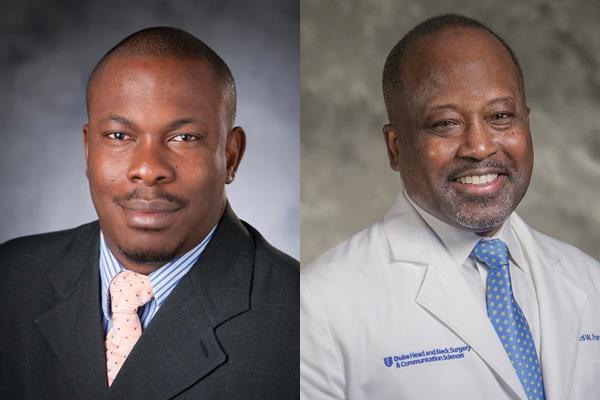
Howard W. Francis, MD, MBA, FACS, the Richard Hall Chaney, Sr. Distinguished Professor of Otolaryngology and Chair of the Head and Neck Surgery & Communication Sciences (HNS&CS) department, and Dennis Frank-Ito, PhD, an associate professor in the HNS&CS department who researches the impact of human airway anatomy on respiratory airflow patterns using computational fluid dynamics at his Computational Modeling Research Lab were recently awarded R25 funding for “Developing a Pathway for Preparing Students for a Career in Otolaryngology and Communication Sciences” by The National Institute on Deafness and Other Communication Disorders of the National Institutes of Health.
The R25 funding is allocated to the Building Academic Advancement Research Training Pathway to Otolaryngology and Communication Sciences (BAA-POCS) program, a research training pathway that will prepare participating undergraduate scholars for graduate or medical school aimed at pursuing research-related careers in Otolaryngology or the Communication Sciences.
Our long-term goal is to increase workforce representation in Otolaryngology and Communication Sciences. Our objective is to develop a comprehensive mentoring and research training experience to prepare undergraduate students for graduate or medical school aimed at pursuing clinical and/or basic science research careers in Otolaryngology and/or Communication Sciences with the support of a highly skilled mentorship team. This program will engage motivated undergraduate students to undergo rigorous research training over a 15-month period, as well as exposure to clinical care and community-based health engagement. Our rationale is that early exposure to research in Otolaryngology and Communication Sciences, accompanied by high quality mentorship, will increase the number of students who are interested, meet competitive candidate criteria and pursue these careers.
The disciplines of Otolaryngology and Communication Sciences face persistent challenges in workforce representation despite projected substantial growth in demand over the coming decade. Contributing factors include constrained training pathways, geographic disparities in provider distribution, and a rising need for services driven by an aging population. In Otolaryngology, the deficit primarily reflects restricted training capacity and workforce supply, whereas in Audiology and Speech-Language Pathology, both limited pipeline growth and rapidly increasing demand contribute to the imbalance. Consequently, there is an urgent need to enhance research training and expand workforce capacity in these fields to meet evolving clinical and public health needs. Our Program – Building Academic Advancement research training Pathway to Otolaryngology and Communication Sciences (BAA-POCS) – will address the ongoing workforce shortage and enhance patient access, healthcare outcomes, and clinical research capacity in these disciplines by providing undergraduate students with a rigorous 15-month research training program, alongside exposure to clinical care and community-based health engagement. In order to achieve our goal we plan to: [1] Conduct a rigorous research training curriculum for preparing undergraduate students for research careers in Otolaryngology and the Communication Sciences; [2] Provide professional development activities to promote professional identity and preparation for graduate or medical school; and [3] Create support groups for students and program alums to engage one another regarding career decisions. The culmination of this BAA-POCS program will provide students with comprehensive research training and mentorship experience, which will generate enthusiasm and self-efficacy, and increase the number of students interested in pursuing careers in Otolaryngology and/or the Communication Sciences.